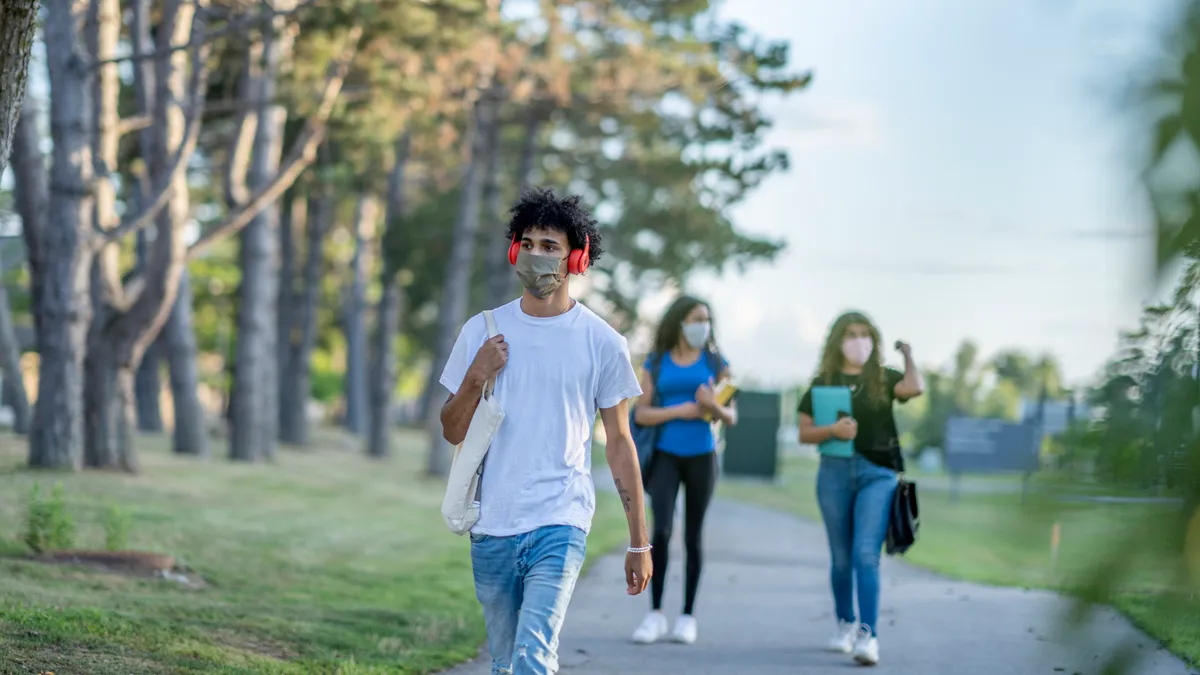Dive Brief:
-
More than 50 liberal arts colleges formed an alliance this week meant to fight systemic racism and foster diversity and inclusion on their campuses. Founding members include DePauw University, as well as Macalester, Oberlin, Occidental and Pomona colleges.
-
Alliance members are collaborating with the University of Southern California's Race and Equity Center to host virtual meetings about campus equity, survey students and employees, and give workers equity-related resources. Membership is $18,000 annually per institution.
-
The alliance is forming during a year marked by protests over systemic racism and police brutality that have sparked nationwide conversations about racial equity.
Dive Insight:
The alliance is similar to the California Community College Equity Leadership Alliance, which the USC center launched this summer. When Lori White, president of DePauw University, in Indiana, learned of the initiative, she pitched a similar idea for liberal arts colleges.
A handful of college leaders quickly backed the idea. "This would not have happened unless other college presidents at liberal arts colleges also thought this was important," White said. Members said the new group — called the Liberal Arts Colleges Racial Equity Leadership Alliance — will enable them to more effectively address racial inequities on their campuses.
"Each independent liberal arts college doesn't stand by itself trying to address these larger systems of inequality," said Suzanne Rivera, president of Macalester College, in Minnesota. "We can address our priorities more effectively if we stand together, pool our resources, leverage talent and act as a group."
The alliance is forming during a pandemic that has disproportionately killed Black and Hispanic people in the U.S., and amid social unrest over systemic racism in policing. Most recently, protests broke out in Philadelphia after Walter Wallace Jr., a Black man, was fatally shot by two police officers.
Up to eight employees from each member institution will be able to attend virtual monthly learning sessions, which will start next year and be hosted by the center, according to a news release. Each meeting will have a different focus, such as recruiting and hiring faculty members of color or confronting specific acts of racial violence.
"On most campuses, there are occasional, very infrequent, disjointed professional development activities on these topics," said Shaun Harper, the center's founder and executive director. "This is continuous (and) rigorous."
The center will also give member schools' employees access to an online portal with equity-related resources, including rubrics, case studies and conversational scripts. It's expected to launch in late spring, according to a news release.
Additionally, the center will survey students about the campus racial climate, and faculty and staff members about their workplace experiences. It is starting with polling students, Harper said, in part because they are often the targets of racist acts on campus.
Member schools will receive their campus's survey results. They will also be able to benchmark their data against the alliance overall as well as three other member colleges with similar demographics or geographic profiles, Harper said.
Likewise, the center will give the schools individualized recommendations such as how they can encourage students to socialize with peers from different racial or ethnic backgrounds. And presidents of member colleges will meet regularly to share their strategies for furthering racial equity on college campuses.
"This is very, very different from past initiatives. I think there is a moment of reckoning in America," said Kent Devereaux, president of Maryland's Goucher College, one of the alliance schools. "Now is the time for us to have honest change."















